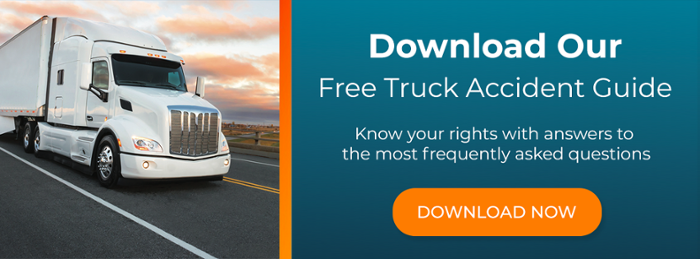
CALL (800) 863-5312 FOR A FREE CONSULTATION WITH ONE OF OUR TRUCK ACCIDENT ATTORNEYS
If you have been involved in an accident with a semi-truck, you may need to file an insurance claim with the trucking company’s insurance carrier. Filing an insurance claim may be a means of collecting compensation for the financial burdens incurred as a result of the accident. In Colorado, trucking companies are required to carry a certain minimum amount of insurance. This article will explain how those requirements may affect you in the event you are involved in a trucking accident. The article will also provide helpful information regarding the claim filing process and forms of compensation that may be available.
If you have been the victim of a trucking accident, do not hesitate to contact Zinda Law Group at (800) 863 5312 for a free consultation with one of our trucking accident attorneys. We are available 24/7, and you will not owe us anything unless we are able to win your case.
For a free legal consultation, call 800-863-5312
COLORADO LIABILITY INSURANCE REQUIREMENTS FOR TRUCK DRIVERS
The state of Colorado and the Federal Motor Carrier Safety Administration (FMCSA) require trucking companies to carry certain types of insurance and a certain minimum amount of insurance coverage.
Primary liability is a mandatory type of insurance that trucking companies are required to maintain. On the other hand, physical damage truck insurance and bobtail coverage are strongly recommended, but not mandatory for intrastate trucking companies. In Colorado, the minimum amount of liability insurance a trucking company must have depends both on the type of freight hauled and where the freight is being carried to.
To learn more about the differences between federal and state law pertaining to trucking, view our article: Federal and State Law Differences.
Trucks That Do Not Cross State Lines
Trucking companies whose vehicles do not cross state lines are required to carry the following minimum liability insurance amounts:
- Household Goods: $300,000
- General Freight: $750,000
- Oil Transport: $1,000,000
- Hazardous Materials: $5,000,000
Click to contact our personal injury lawyers today
Trucks That Do Cross State Lines
The minimum liability insurance requirements for trucks that cross state lines are more comprehensive. In addition to having to meet the above requirements, trucking companies must also comply with the Department of Transportation truck insurance requirements set forth by the FMCSA. In general, however, typical federal liability limits are $750,000 or $1,000,000.
Complete a Free Case Evaluation form now
Companies May Carry Additional Insurance
It is important to keep in mind that the above amounts are bare minimum limits. In reality, trucking companies often have higher amounts of coverage, often at the request of third parties. For instance, many shippers and brokers require trucking companies to have a liability limit of at least $1,000,000, regardless of what type of freight is being hauled. Also, physical damage insurance, a type of coverage that protects a trucking company’s personal tractor or trailer from accidents on the road, is required if the trucking company decides to finance its truck.
WHAT IS COVERED BY TRUCKING COMPANIES’ INSURANCE?
There are various types of trucking-related insurance coverage. Whether a particular event or loss will be covered depends on the types of coverages a trucking company maintains. Listed below is a brief overview of basic truck insurance coverage for the truck and transportation industry.
Primary Liability
Trucking companies are required by law to carry primary liability insurance. This type of coverage will pay for injuries to other drivers on the road and any damage to public property that may be caused by an accident caused by a truck driver. The amount paid to the victim depends on the amount of coverage maintained by the trucking company.
General Liability
General liability insurance pays for injuries or property damage caused by a trucking company as a result of business activities that were not directly related to operating a truck. One example of this would include a person sustaining a slip-and-fall injury at the trucking company’s place of business. General liability insurance may provide coverage relating to bodily injury, property damage, and medical payments.
FILING A CLAIM AGAINST A TRUCKING COMPANY
Colorado is a fault-based car accident state. This means that the person who was at fault for the accident must pay the damages you suffered. However, the truck driver or trucking company will not be expected to initially pay for these costs out of pocket. Rather, the trucking company’s insurance company will cover these costs up to their policy limits. Thus, the first step in the claim-filing process is to file an insurance claim with the at-fault trucking company’s insurance carrier.
To learn more about how fault is determined in a trucking accident, view our article: How Is Fault Determined in a Truck Accident?
After your claim has been filed with the trucking company’s insurance carrier, a claims adjuster may be assigned to your case. The adjuster will be responsible for investigating the facts and circumstances regarding the accident that led to your injury.
Once the claims adjuster is done investigating, the adjuster will calculate a value for your claim. This value is supposed to reflect the cost of your injuries and damages. However, it is important to realize that many formulas and programs utilized by claims adjusters are designed to lower the amount of your claim. This occurs because programs often fail to account for important factors such as stress, emotional trauma, and inability to participate in activities that you used to enjoy.
Because the strategies and tactics used by claims adjusters are designed to keep insurance companies profitable, you may receive a settlement offer below the actual value of your claim. If this happens, you may want to consider consulting with an experienced personal injury attorney who may be able to provide you with valuable information and tips regarding the negotiation of your settlement offer.
COMMON MISTAKES WHEN DEALING WITH AN INSURANCE COMPANY
Negotiating against multi-million-dollar insurance companies and claims adjusters with years of experience handling and settling claims can be an intimidating task even for a seasoned negotiator. In many cases, victims of trucking accidents have little to no experience dealing with insurance companies. This inexperience may lead to mistakes during the settlement process which can hurt the overall value of a claim.
Discussing the Case With an Adjuster
For instance, victims are often too willing to discuss the accident with a claims adjuster. It is important to remember that adjusters represent the insurance company. Thus, adjusters operate with the best interests of the insurance company in mind, not yours. Candid conversations between a claimant and a claims adjuster may result in statements which can hurt the value of your claim. Additionally, when dealing with an adjuster without an attorney, it is advisable to avoid recorded statements or signing any medical releases.
Settling Too Early
Another common mistake is settling too early. In many cases, victims of trucking accidents are too eager to receive a payout. When an insurance company makes an initial settlement offer, this eagerness may lead to the claimant hastily accepting the deal. However, it is important to realize that settlement amounts can be negotiated in your favor.
Learn More: How Do Truck Accident Settlements Work?
Admitting Fault
Finally, an inexperienced claimant may inadvertently or even intentionally admit to fault for some or all of the accident. Admitting to even partial fault can destroy your claim. Thus, it is critical that you be careful with your words in the event you discuss your claim with an insurance company.
Not Contacting An Attorney
Fortunately, victims of accidents do not have to deal with insurance companies by themselves. A personal injury lawyer may assist a claimant in dealing with insurance companies and claims adjusters by strategically negotiating settlement amounts. A personal injury attorney may also be able to advise the injured parties with what they should admit or deny. Finally, a personal injury lawyer may advocate on the victim’s behalf, should the case proceed to trial.
Learn More: Do I Need a Truck Accident Lawyer?
COMPENSATION FOR TRUCKING ACCIDENTS
Knowing what your claim is worth and how it is calculated is an important part of the claim filing and claim settlement process. Understanding this information may help facilitate the settlement and negotiation process.
In cases involving trucking accidents, the driver, the trucking company, or the insurance carrier faces the possibility of having to compensate the victim for the harm suffered as a result of the accident. The damages that may be awarded to a victim of a trucking accident are separated into three general categories: economic damages, non-economic damages, and punitive damages.
Economic Damages
Economic damages are damages which may be accounted for and added up. The primary forms of economic damages involved in trucking accidents may include:
- Medical bills
- Lost income (present and future)
- Property damage
Medical bills include costs paid by the victim for services such as hospital visits, doctors’ appointments, pharmaceuticals, rehabilitation services, and physical therapy. Lost income refers to time missed from work due to injuries sustained as a result of the accident. If the injury prevents or impairs the victim’s ability to work beyond the date of the accident, lost income may also include the victim’s loss in earning capacity. Property damage refers to damage inflicted to the victim’s vehicle and personal belongings.
Non-Economic Damages
Non-economic damages refer to intangible losses which cannot be added up on paper. Rather, non-economic damages are subjectively evaluated by the jury in a lawsuit. The primary forms of non-economic damages involved in trucking accidents may include:
- Pain and suffering
- Emotional distress
- Disfigurement
- Disability
- Loss of consortium
Punitive Damages
Punitive damages may also be awarded in extreme circumstances. This form of damages is not awarded to compensate the victim for losses incurred. Rather, punitive damages are meant to punish the at-fault party. Although punitive damages are rare, they may be awarded in cases where the at-fault party’s conduct was found to be especially reckless or intentional. Punitive damages may also be awarded if the accident resulted in a wrongful death. In such cases, punitive damages may be awarded to the victim’s surviving spouse or family members if the at-fault party’s conduct was found to be reckless, egregious, or intentional.
It is important to note that although trucking companies are required to carry minimum insurance amounts, it may be possible that your medical bills and other damages exceed the trucking company’s policy limits. In this scenario, you essentially have two options.
The first option is to file a claim with your own insurance company. Under this option, you may be able to receive compensation up to your policy limits, thereby giving yourself a chance to cover the cost of medical bills and other damages.
The second option is to file a personal injury lawsuit in civil court against the other driver or against the trucking company. Under this option, the proceeds from a successful trial or settlement may be used to cover the cost of medical bills and other damages.
CONTACT ZINDA LAW GROUP TODAY
At Zinda Law Group, our truck accident attorneys have the experience needed to assist you in case of a trucking accident. We take pride in representing trucking accident victims and are always ready to provide our clients with the knowledge and resources necessary to help you address the concerns that come with being involved in a wreck.
If you would like to speak with an experienced truck accident lawyer, or to learn more about the claim filing process, call Zinda Law Group at (800) 863-5312 to receive your free case evaluation.
Meetings with attorneys are by appointment only.
Suggested Reading:
TX Trucking Company Insurance Requirements
Call or text 800-863-5312 or complete a Free Case Evaluation form










